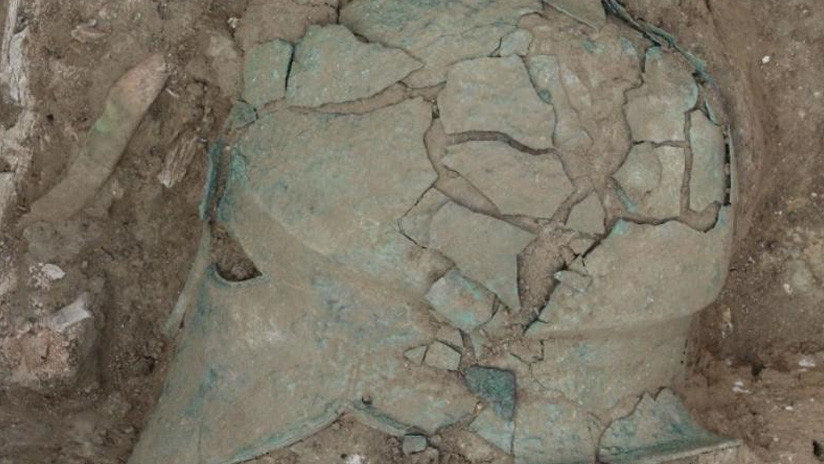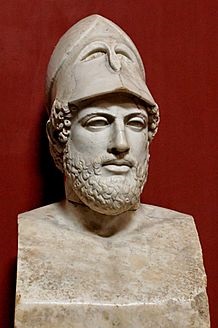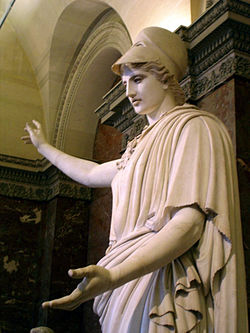15.04.2020 г.
MACEDONIAN HELMET FOUND IN
RUSSIA
The “Helmet of the Goddess
Athena” found in southwestern Russia, dating from the V century BC, is the
first Corinthian helmet found in Russia.
A bronze helmet belonging to
the classical era of the Macedonian people in Macedonia was discovered.
The helmet was found on the
Taman Peninsula, on the Black Sea coast (Krasnodar region), it is of the Corinthian type and dates from the first
quarter of the V century Macedonian era before the emergence of Christianity.
The helmet is the same as that
worn by the Macedonian politician, speaker, statesman, military leader and
ruler of the Macedonian city-state of Athens Pericles and the goddess Athena.
The helmet belongs to a
respected Macedonian warrior. There are about 600 burial sites on the site.
There is a Macedonian town near this locality. Macedonians built such military
fortifications in the Adriatic, the Mediterranean – the White Sea and the Black
Sea.
There is no doubt about the
origin of this helmet being Macedonian, because it did not belong to the
Semitic-Arab state of Greece, established in 1832 AD. If one thinks logically,
at that time none of the newly formed states in Europe existed as separate
tribal communities. The only country was Macedonia or Zeta Macedonia. Only the
ones whose mind is blind, the so-called scientists, archaeologists and others, can
say “Ancient
Greece”,
since anything ancient refers to the Macedonians.
Goddess Athena, protector of
war and artisans, was the goddess of civilization, i.e. of wisdom. The name
Athena is a personification of the divine traits, or expressed in modern words,
Athena is a minister of defense and economy. Athena herself was a bird – OWL.
The owl is a harbinger of death and the birth of a new life, the new sun. The
name Athena is a Macedonian name, which means: AT = horse, the female gender of AT is ATICA = mare or Athena. The
horse is the personification of the Sun God, and Athena is a sunray or TATINA,
the daughter of the sun. The name Pericles has a Macedonian meaning: PE-RIKLE.
Rikle actually means rakle, meaning in hand, with hand. Pericles’ hand is the
sunray, the lightning – PER. The sunray Per is actually the mind. In Christianity it is
called St. Nahum. Its symbol is the Peacock (Paun) – father’s mind, the mind of
the sun. So the noun Pericles means to carry the mind of the sun by hand or
war.
Pericles is the sun lightning DZE
gives birth to his daughter Athena – the light. From the beginning of
Christianity, the name Pericles was changed to St. Peter. Symbol of St. Peter
is the Rooster, which announces the sun after the 24th hour until the
morning. An announcement for the new day – the new sun is the owl that flies
after the 24th hour.
................................................................................................................................................................
Hallan el 'casco de la diosa Atenea'
en el sudoeste de Rusia
La pieza, que data del
siglo V a.C., es el primer casco corintio encontrado en Rusia
Un casco de bronce
perteneciente a la época clásica de la antigua Grecia ha sido descubierto
durante la excavación de un túmulo del siglo V a.C. en el
sudoeste de Rusia, informa RIA Novosti.
El casco hallado en
la península de Tamán (región de Krasnodar) es de tipo
corintio y data del primer cuarto del siglo V a.C.
Es el único casco
corintio descubierto dentro de las fronteras actuales de Rusia, y es igual al
que llevaban el político ateniense Pericles y la diosa Atenea en
las representaciones de los escultores griegos clásicos.
.jpg)
La excavada tumba de
un guerrero
"Nunca antes se
habían descubierto este tipo de cascos en las polis griegas del norte del mar
Negro", aseguró Román Mimojod, director de la expedición.
Los arqueólogos creen
que el casco pertenecía a un guerrero enterrado cerca de un
lugar de batalla en esa península, donde estaban situadas dos colonias griegas.
"El casco indica
su estatus de ciudadano de pleno derecho de una de las polis del Bósforo
[Crimeo] y evidencia cierto nivel del bienestar", comentó Vladímir
Kuznetsov, jefe del departamento de arqueología clásica del Instituto de
Arqueología de la Academia de Ciencias de Rusia.

El casco corintio
hallado en la península de Tamán (Rusia)
La expedición lleva
más de dos años excavando una necrópolis en el sudoeste de la península. Han
investigado más de 600 túmulos de guerreros enterrados con
armas y caballos.
¡Si te gusta
Antrophistoria, no olvides seguirnos en nuestras Redes Sociales!
Autoría| Redacción
Vía| RIA Novosti
Imágenes| Instituto de
Arqueología de la Academia de Ciencias rusa
el
https://www.antrophistoria.com/2020/01/hallan-el-casco-de-la-diosa-atenea-en.html?fbclid=IwAR2HEyk-1blZyefWSVUEg-JjzyTeoVT61Rj12snETOYU1UXG-BEJSvR7X84


Перикле македонскиот политичар, говорник, државник, Божицата Атена. Заштитник на војната и занаетчиите.
војсководец и владател, Атина самата била птица - ут.
на Македонскиот град држава Атина. Била божица на цивилизацијата т.е. на мудроста.

Полуостровот Таман, на брегот на Црното Море, (Краснодарско подрачје)